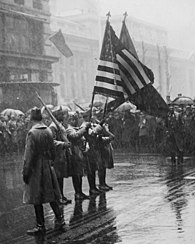Allen Allensworth
Allen Allensworth (April 7, 1842 – September 14, 1914) was an American chaplain, colonel, city founder, and theologian.
Born into slavery in Kentucky, he escaped during the American Civil War by joining the 44th Illinois Volunteers as a Union soldier.
Allensworth was a prolific public speaker, embarking on a speaking tour with the goal of inspiring Black youth.
[4] Over the years, their family was scattered: his sister Lila escaped with her intended husband to Canada via the Underground Railroad; and the older boys William, George, Frank, Levi and Major were sold downriver to plantations in the Deep South, which continued to buy enslaved workers from the Upper South to develop the cotton industry.
After his father died when Allen was young, his mother chose to be sold as a cook to a neighbor, the attorney Nat Wolfe.
Mrs. Talbot, a Quaker, was kind to Allen and continued to teach him to read and write; she also took him to a Sunday school for slave children.
There he was bought by Fred Scruggs, who taught him to work as an exercise boy and jockey in Jefferson, Louisiana.
[4] While working nearby on a farm where Scruggs' deputy had placed him, Allensworth met soldiers from the 44th Illinois Volunteer Infantry Regiment, a Union unit encamped near Louisville.
After serving as a civilian nursing aide for some time, he was invited to accompany Dr. A. J. Gordon, one of the surgeons, to his home in Georgetown, Ohio.
There Allensworth dined with Gordon's family, was given a room of his own, and felt he first walked as a free man.
With the war continuing, on April 3, 1863, Allensworth enlisted in the US Navy, where he earned his first pay as a free man.
[4] Inspired by his own teaching, he began attending courses at the Nashville Institute, later known as the Roger Williams University, but did not graduate.
Allensworth was among the founders of The State University, helped guarantee the salary of the president in the early years, and served on the Board of Trustees.
[4] He returned to Louisville when called to be pastor of the Harney Street Baptist Church, which he reorganized, attracting many new members.
On his return, he met people from the American Baptist Publication Society in Philadelphia, who appointed him as Sunday School Missionary for the state of Kentucky.
[6] In 1887, Allensworth was featured in Men of Mark: Eminent, Progressive and Rising, an anthology of African-American biographies by William J.
He was inspired by the idea of establishing a self-sufficient, all-black California community where African Americans could live free of the racial discrimination that pervaded post-Reconstruction America.
His dream was to build a community where black people might live and create "sentiment favorable to intellectual and industrial liberty.
"[16] By 1908, he had founded Allensworth in Tulare County, about thirty miles north of Bakersfield, in the heart of the San Joaquin Valley.
The black settlers of Allensworth built homes, laid out streets, and put up public buildings.
[17] The Allensworth colony became a member of the county school district and the regional library system and a voting precinct.
In 1914, the California Eagle reported that the Allensworth community consisted of 900 acres (360 ha) of deeded land worth more than US$112,500.
Col. Allensworth was an admirer of the African-American educator Booker T. Washington, the founding president and longtime leader of the Tuskegee Institute in Alabama.
The 1915 voting registration showed "farmers, storekeepers, carpenters, nurses and more, all suggesting that the colony’s business and industrial output was prodigious.
The Great Depression and World War II drew people to places with greater opportunities.
It was updated in 1985[6][21] from funding attained from historic development section of the California Parks and Recreation Facilities Act of 1984.




